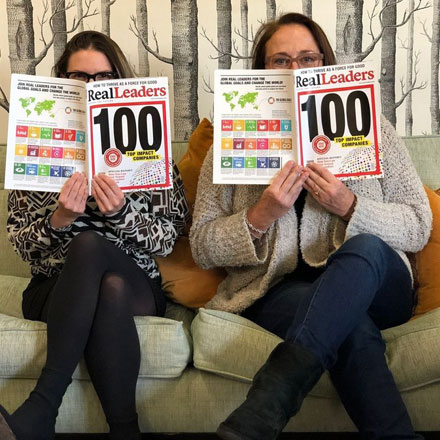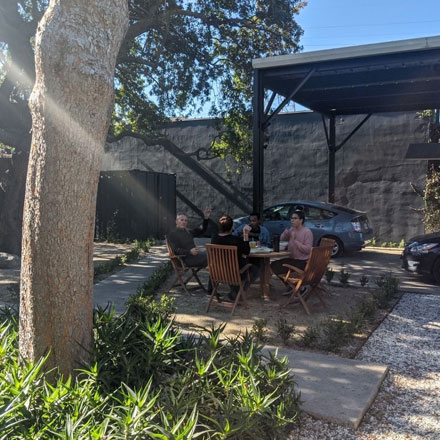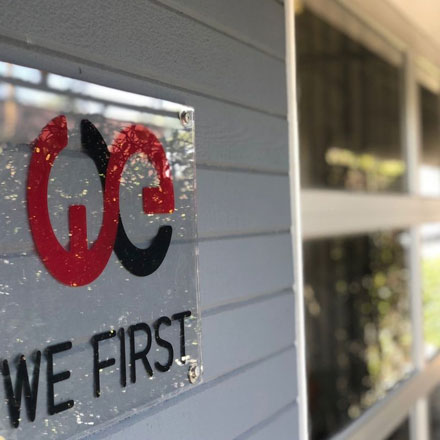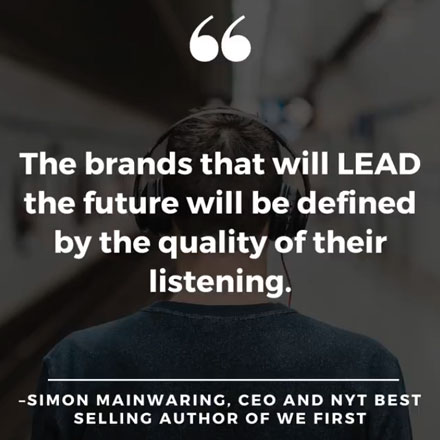
Purpose At Work
Vivobarefoot Walks The Line Between Ultramodern & Ancient Wisdom
More than 24 billion pairs of shoes are produced each year, with up to 95 percent likely to end up in landfill — often within just 12 months of purchase.
Vivobarefoot is putting its foot down to stop that kind of waste.
Founded in 2012 by eco-conscious shoe pioneer, Galahad Clark, and his cousin and childhood best friend, Asher Clark, a designer, the London-based certified B-Corp innovated minimalist running shoes that promote natural movement.
“Vivo’s” groundbreaking tech, developed in collaboration with Tim Brennan and British shoe company Terra Plana aims to mimic the experience of walking and running barefoot, enhancing posture, optimizing biomechanical benefits, and bettering overall health.
“That’s the Vivo mission in a nutshell right there,” says Clark, Vivo’s CEO and Chief Ecosystem Officer. “People often ask, ‘What’s the magic in these shoes?’ And it’s just going back to the way we used to do things — with a bit of modern technology involved.”
Vivo boasts a long lineage — seven generations! — of cobblers. Its forefathers established the renowned UK shoe brand Clarks in 1825. Even then, its shoes made from sheepskin offcuts minimized waste and maximized ingenuity.
Before 2009, Vivo was a sub-brand of Terra Plana and United Nude, which Clark co-founded in 2002.
Privately held and funded through grants, equity crowdfunding, and venture capital investments, Vivo sold just under a million pairs of shoes in 2023. It projects £94 M annual revenue for 2024, based on 2023’s £73 M.
All by doing things extremely differently from the norm.
Best Foot Forward
Clark argues that “Few people in the footwear industry really understand foot anatomy.” Decades ago, he began an educational odyssey, studying the science of proper fit and optimal posture, and the history and art of shoemaking.
“It was a Pandora’s box of understanding how shoes were always made wherever you were in the world,” says Clark. “I traveled all over the world. I met bushmen in the Kalahari, the Sami people in the Arctic, and spent time with the Navajo making bison moccasins.”
What was his revolutionary conclusion at the end of that quest? “All those shoes were simply made from the local sustainable materials. They completely allowed the foot to do its natural thing, person by person, foot by foot,” says Clark.
That’s not just Clark’s personal opinion. “We also did biomechanical studies with all these people, and we realized that their feet were working a lot better than ‘Western’ feet, were healthier,” he says. “There were no injuries, there were no incidents of any morphology as you find in the West.”
“So, it was just this glaringly obvious thing that [our typical] shoes are not only undermining foot health, they’re undermining the natural movement.”
Whereas, says Clark, “You will be healthier if your foot works better. It’s as simple as that. With a strong healthy foot, the rest of your body works better. Your musculoskeletal system — the 28 bones, 33 joints, and hundreds of muscles, tendons, and ligaments — and your nervous system all start in your feet. And if they’re allowed to fully function, then the rest of your body works better.”
A Step in the Right Direction
Not to mention, says Clark, shoe manufacturing is “obviously one of the most polluting industries in the world,” says Clark.
It’s true. The typical pair of sneakers generates 30 pounds of CO2 emissions — enough to keep a 100-watt light bulb on for a week.
Thus, Vivo formed around two interlinked insights: That barefoot-style footwear is regenerative to human health, and that “the natural world is the only real model of sustainability.” The two work, well, hand-in-hand, says Clark.
Vivo’s language around sustainability and regeneration is a model not only for its industry — predicted to be worth USD 568.54 billion by 2031 — but well beyond. Because, ultimately, “The closer people are to nature,” says the company, “the more they will protect it. “Instead of fighting nature,” says Clark, “we need to let nature heal us.”
In turn, Clark believes, we must take steps to help heal nature. Therefore, Vivo is deeply committed to sustainability and environmental consciousness. It has set ambitious goals, including the elimination of virgin plastic throughout its supply chain.
The average shoe shoes are made of synthetic and often toxic materials that take years to biodegrade, all the while poisoning the environment. Today, Vivo is transitioning toward producing 100 percent recyclable, repairable, and/or biodegradable footwear. It’s been actively exploring alternative manufacturing materials with reduced environmental impacts.
Vivo also gives back to local communities. For example, the company partners with Soul of Africa, an independent social enterprise. Vivo has a license to sell shoes under the SofA brand, made in Ethiopia. Profits go to the Soul of Africa charitable trust for local community projects at the place of manufacture, Addis Ababa. Clark directed SofA from 2010 to 2019.
“We’re just in the process of launching a trademark for effectively ‘heritage cobbling’ from around the world and trying to recognize those groups that are still making shoes the way they made them since almost the dawn of time. And protecting that shoemaking process, protecting those people.
“With all the modern restrictions and things,” says Clark, it’s “becoming harder and harder” to honor those traditional methods of cobbling. “But ultimately, we do genuinely believe that going back 10,000 years, we made sustainable healthy shoes — because there was no other choice.
“And 10,000 years later,” Clark concludes, “we need to start making sustainable, healthy shoes again because there is no other choice. Which means making shoes person by person, foot by foot from local sustainable materials.”
“In our case, we’ll have to use modern technology to scale that at a mass level, but let’s not forget where it all came from, where all the wisdom really came from.”





